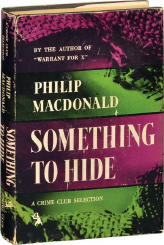Wed 19 Mar 2014
Reviewed by William F. Deeck: PHILIP MacDONALD – Something to Hide.
Posted by Steve under Reviews[8] Comments
William F. Deeck
PHILIP MacDONALD – Something to Hide. Doubleday Crime Club, US, hardcover, 1952. No paperback edition. Published in the UK as Fingers of Fear: Collins, hardcover, 1953. A “Queen’s Quorum” title.

This collection comprises two novellas and four short stories, all exceptionally well done. Two of the stories display the abilities of Doctor Alcazar, MacDonald’s “clairvoyant” detective.
In “The Green-and-Gold String,” Alacazar is at his tent at the carnival and reads the future — “General Reading–50 cents. Special Delineation–$1.00†— of a lady’s maid, who is murdered several days later. Her employer offers a reward of $5000, and Alcazar can’t resist the “easy” money. Alcazar is a character, of course, but a superb psychologist and bluffer, and he traps the murderer into a confession.
In the second story about Alcazar, “Something to Hide,” he and companion, the carnival’s former Weight-Guesser, are down on their luck. Their former client knows a rich woman with a problem, but how is Alcazar to know what the problem is? No one needs to tell a clairvoyant anything; he should already know it. As Avvie says:
“The Wood-for-the-Trees” has Anthony Gethryn returning to England from the US in the summer of ’36. He is delivering a letter from a Personage of Extreme Importance in the US to another P.O.E.I. in England. The area to which he is delivering the letter has recently had two murders by, ostensibly, an obvious maniac.
A third occurs while Gethryn is there, and he quite frankly admits that a motiveless crime is best handled by “routine politico-military methods.” Something his son says on his return home and wifely suspicions, however, put him on to the murderer.
“Malice Domestic” deals with a husband who is being given poison, most probably by his wife, and the “happy” ending, or at least happy if you’re the murderer.
“Love Lies Bleeding” is something of a horror story. How does Cyprian Morse, having killed a young lady in hot blood after she tries to seduce him — Cyprian is CD all of the way, you see — manage to be freed after telling a quite implausible tale of how the murder happened? A fairly evident ending, but nonetheless a powerful story.
Finally, “The Fingers of Fear” deals with a child molester and murderer. After he has presumably been apprehended, Lieutenant (acting Captain) J. Connor, the man who arrested him, begins to have doubts, doubts that are reinforced by his wife. Connor and his wife begin their own investigation.
March 20th, 2014 at 3:26 pm
This is a great collection, and the Gethryn is an exceptional outing. All the stories are good though “Malice Domestic” and “Love Lies Bleeding” are probably his most anthologized stories.
March 20th, 2014 at 4:31 pm
I have to get over the idea that I don’t like short stories. These sound good.
March 20th, 2014 at 9:23 pm
Am I correct in thinking MacDonald may be one of the most forgotten of the one-time Golden Age masters?
March 21st, 2014 at 8:25 am
I read “Love Lies Bleeding” over a decade ago, long before I became a fan of MacDonald, and didn’t realize he wrote it. It’s just terrific. Anyone know if this was the first story with that title? I’ve seen one other, though I think it was novel length.
March 21st, 2014 at 11:55 am
Graham,
You may be thinking of the Edmund Crispin novel of that title — also quite good, although quite different than the MacDonald.
March 21st, 2014 at 5:28 pm
Steve
I agree about MacDonald. He is one of the most readable writers in modern terms from that period, and unlike many maintained quality and sales to the end with The List of Adrian Messenger a stunner of a tour de force. He’s also a fine screenwriter with considerable credits and author of one of the most copied plots of all time The Patrol, first filmed by John Ford as The Lost Patrol and remade or ripped off numerous times since.
May 31st, 2016 at 8:31 am
Until 1956, the Edgar in the short story category was not given to an individual short story. It was given for the best achievement in the short story medium. It might be gvien for editing an anthology, or a magazine, or for being the author of a particularly distinguished collection, or just for general continued excellence as a short story writer.
In 1953, the Edgar for best achievement in the short story field was awarded to MacDonald for this collection.
May 31st, 2016 at 10:18 am
Both interesting and useful information. Thanks, Jim!